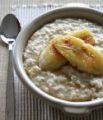Food For A Restful Slumber
After a tiring day if you are unable to get a night’s sleep, just don’t pop a sleeping pill. Instead, look in your kitchen. After all, what you eat, when you eat and how much you eat, can make a difference to the quality of sleep you get.
 Have a light bed-time snack:
Have a light bed-time snack:
However strange it may sound, a snack before sleeping is recommended. Eating draws blood into the gastrointestinal tract and away from the brain. And if you draw blood away from the brain, you’re going to get some sleep. But keep the snack to 200 calories only (for instance, slap together a peanut butter whole wheat sandwich). Anything more that that can make you feel bloated and too uncomfortable to sleep. Here are some choices:
 Dairy: The warm glass of milk before bedtime is not just another cliche from our grandmothers. Milk and dairy foods contain an amino acid L-tryptophan which affects the part of the brain that governs sleep. The body converts tryptophan into serotonin, which is then converted into melatonin. Both serotonin and melatonin make you feel relaxed and sleepy.
Dairy: The warm glass of milk before bedtime is not just another cliche from our grandmothers. Milk and dairy foods contain an amino acid L-tryptophan which affects the part of the brain that governs sleep. The body converts tryptophan into serotonin, which is then converted into melatonin. Both serotonin and melatonin make you feel relaxed and sleepy.
 Wholewheat Toast or Rice: For trytophan to be most effective, however, it’s important to have it in combination with carbs or starches. When you eat carbs the body releases insulin, which pushes amino acids except trytophan into muscle cells. This leaves trytophan first in line to get back to the brain. Research also endorses this. So go ahead and munch a piece of toast with a dollop of honey( also trytophan-rich).
Wholewheat Toast or Rice: For trytophan to be most effective, however, it’s important to have it in combination with carbs or starches. When you eat carbs the body releases insulin, which pushes amino acids except trytophan into muscle cells. This leaves trytophan first in line to get back to the brain. Research also endorses this. So go ahead and munch a piece of toast with a dollop of honey( also trytophan-rich).
 A Banana Or Oatmeal: Melatonin is produced not just in the body but also found in foods such as oats, bananas, rice and sweet corn. These foods boost your melatonin levels and help prepare your body before sleep.
A Banana Or Oatmeal: Melatonin is produced not just in the body but also found in foods such as oats, bananas, rice and sweet corn. These foods boost your melatonin levels and help prepare your body before sleep.
 Nuts: Almonds and cashews are good sources of magnesium – a mineral that induces sleep. Experts point out that low magnesium levels stimulate brain-activating neuro-transmitters and with your brain all abuzz, you cannot sleep. There are studies to suggest this: Magnesium treatment increased deep sleep and improved brain waves during sleep in 12 elderly subjects. Other good sources of magnesium: Brown rice, mushrooms, bananas (33mg magnesium in one banana), milk, spinach and soya beans.
Nuts: Almonds and cashews are good sources of magnesium – a mineral that induces sleep. Experts point out that low magnesium levels stimulate brain-activating neuro-transmitters and with your brain all abuzz, you cannot sleep. There are studies to suggest this: Magnesium treatment increased deep sleep and improved brain waves during sleep in 12 elderly subjects. Other good sources of magnesium: Brown rice, mushrooms, bananas (33mg magnesium in one banana), milk, spinach and soya beans.
 Tuna And Lean Meat: These are rich in vitamin B which helps you sleep better. B vitamins regulate many amino acids, including tryptophan. Other sources: Sunflower seeds, wheatgerm and bananas.
Tuna And Lean Meat: These are rich in vitamin B which helps you sleep better. B vitamins regulate many amino acids, including tryptophan. Other sources: Sunflower seeds, wheatgerm and bananas.
Sleep Robbers:
 Coffee And Chocolates: Research shows that caffeine increases anxiety and impairs sleep. Caffeine works as a stimulant that increases the activity of the central nervous system. But it is not just late night caffeine that can leave you staring at the ceiling – a cup in the afternoon can also keep you awake, since it takes 6-8 hours for the body to get rid of caffeine. Avoid chocolates too. A serving of chocolate doesn’t have as much caffeine as a cup of coffee (around 20 mg less than expresso) or a cola, but it can have the same effect.
Coffee And Chocolates: Research shows that caffeine increases anxiety and impairs sleep. Caffeine works as a stimulant that increases the activity of the central nervous system. But it is not just late night caffeine that can leave you staring at the ceiling – a cup in the afternoon can also keep you awake, since it takes 6-8 hours for the body to get rid of caffeine. Avoid chocolates too. A serving of chocolate doesn’t have as much caffeine as a cup of coffee (around 20 mg less than expresso) or a cola, but it can have the same effect.
 Wine And Smoke: Alcohol may initially induce sleep, but once it wears off, sleep is fragmented. Nicotine, too, is a stimulant and can keep you up. It’s a good idea to skip the last drink at the party and have some milk at home instead.
Wine And Smoke: Alcohol may initially induce sleep, but once it wears off, sleep is fragmented. Nicotine, too, is a stimulant and can keep you up. It’s a good idea to skip the last drink at the party and have some milk at home instead.